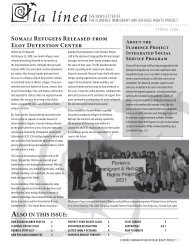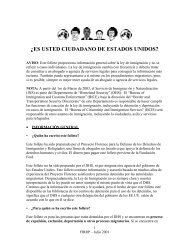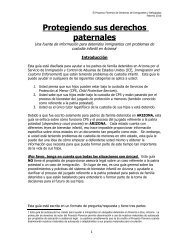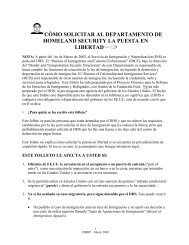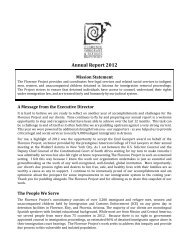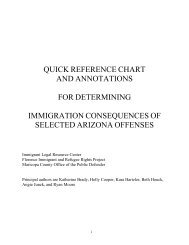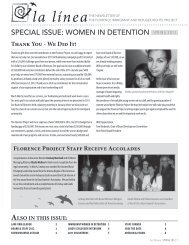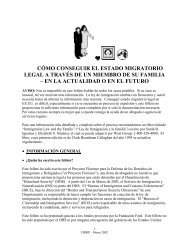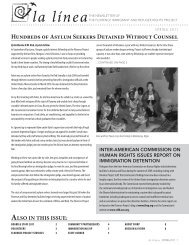HOW TO APPLY FOR ASYLUM - The Florence Project
HOW TO APPLY FOR ASYLUM - The Florence Project
HOW TO APPLY FOR ASYLUM - The Florence Project
Create successful ePaper yourself
Turn your PDF publications into a flip-book with our unique Google optimized e-Paper software.
1. Explain that you are in immigration proceedings and that you are applying for asylum to remain in this<br />
country. Explain the criminal conviction or other problem, and that you need to show the judge that you<br />
deserve asylum and will be a productive member of society.<br />
2. Ask the person to include:<br />
• How he or she knows you (for example, s/he is your neighbor, sister, boss), and how long he or she has<br />
known you.<br />
• Other information the judge will want to know, for example:<br />
o<br />
o<br />
o<br />
o<br />
What are the good points this person knows about you What are the good things you have done<br />
for this person or for others in the family or in society<br />
What will happen to you if you are sent back Only people who personally know about your<br />
situation in your country, such as your family members, should answer this question.<br />
What kind of work history do you have Your boss or former employer can say how long you<br />
worked for him or her, what your responsibilities were, and what kind of a worker you were.<br />
If you were convicted of a serious crime, a person who knows you well or knows about the<br />
circumstances of the crime should talk about how you got involved in this problem, and why he<br />
or she thinks you will not repeat this behavior and you will not be a danger to society. You may<br />
even be able to get a letter from the lawyer who represented you in criminal court.<br />
If the Immigration Judge has determined that you may only be eligible for withholding (because you do not<br />
qualify for asylum), the judge cannot consider letters like this. As we have already discussed, he or she can only<br />
consider your crime if he or she is deciding whether you will be eligible for protection, in other words, whether<br />
your crime is a “particularly serious crime.”<br />
• Other proof regarding criminal convictions<br />
<strong>The</strong>re are three things you may try to get if you have criminal convictions that may help you prepare your<br />
case:<br />
1) the “presentence report” from your criminal case;<br />
2) a copy of DHS’s file on you; and<br />
3) your FBI “rap sheet”<br />
We will talk about what these are and how to get them.<br />
• <strong>The</strong> presentence report<br />
This is a report that is sometimes written before someone is sentenced in a criminal case. It normally talks about<br />
your personal history, your criminal history, including probation violations, and the circumstances of the crime,<br />
among other things. It may say helpful things, and in this case, you will want to file it with the Immigration<br />
Court. On the other hand, it may say bad things about you. If so, you probably do not want to give a copy to the<br />
judge. It is a good idea to review the report in case DHS has a copy and wants to use it against you. Be prepared<br />
Page 34 of 49<br />
FIRRP- last update June 2007




